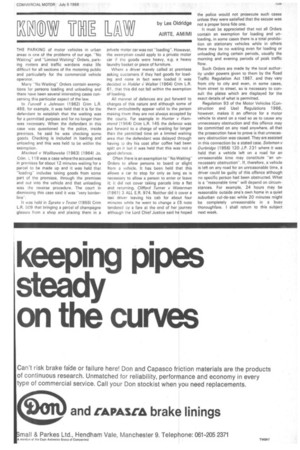Wg UiE
Page 111

If you've noticed an error in this article please click here to report it so we can fix it.
by Les Oldridge
&Ni AIRTE, AMIMI
THE PARKING of motor vehicles in urban areas is one of the problems of our age. "No Waiting' and "Limited Waiting" Orders, parking meters and traffic wardens make life difficult for all sections of the motoring public and particularly for the commercial vehicle operator.
Many "No Waiting" Orders contain exemptions for persons loading and unloading and there have been several interesting cases concerning this particular aspect of the law.
In Funnel! v Johnson (1962) Crim L.R. 488: for example, it was held that it is for the defendant to establish that the waiting was for a permitted purpose and for no longer than was necessary. When the defendant in this case was questioned by the police, inside premises, he said he was checking some goods. Checking is included in loading and unloading and this was held to be within the exemption.
Macleod v Woilkowska (1963) (1964) Jo. Crim. L118 was a case wheiethe accused was in premises for about 12 minutes waiting for a parcel to be made up and it was held that "loading" includes taking goods from some part of the premises, through the premises and out into the vehicle and that unloading was the reverse procedure. The court in dismissing this case said it was "very borderline".
It was held in Sprake v Tester (1955) Crim L.R. 509 that bringing a parcel of champagne glasses from a shop and placing them in a
private motor car was not "loading-. However, the exemption could apply to a private motor car if the goods were heavy, e.g. a heavy laundry basket or piece of furniture.
Where a driver merely called at premises asking customers if they had goods for loading and none in fact were loaded it was decided in Holder t; Walker 11964} Crim L.R. 61, that this did not fall within the exemption of loading.
All manner of defences are put forward to charges of this nature and although some of them undoubtedly appear valid to the person making them they are not always accepted by the courts. For example in Hunter v Hammond (1964) Crim L.R. 145 the defence was put forward to a charge of waiting for longer than the permitted time on a limited waiting area that the defendant was delayed through having to dry his coat after coffee had been spilt on it but it was held that this was not a good defence.
Often there is an exemption to -No Waiting" Orders to allow persons to board or alight from a vehicle. It has been held that this allows a car to stop for only as long as is necessary to allow a person to enter or leave it: it did not cover taking parcels into a flat and returning. Clifford Turner v Waterman 11 961 ) 3 ALL E.R. 974. Neither did it cover a taxi driver leaving his cab for about four minutes while he went to change a £5 note tendered by a fare at the end of her journey althougn the Lord Chief Justice said he hoped
the police would not prosecute such cases unless they were satisfied that the excuse was not a proper bona fide one.
It must be appreciated that not all Orders contain an exemption for loading and unloading, in some cases there is a total prohibition on stationary vehicles while in others there may be no waiting even for loading or unloading during certain periods, usually the morning and evening periods of peak traffic flow.
Such Orders are made by the local authority under powers given to them by the Road Traffic Regulation Act 1967, and they vary from city to city and even, in some cases, from street to street, so is necessary to consult the plates which are displayed for the exact details of what is permitted.
Regulation 93 of the Motor Vehicles (Construction and Use) Regulations 1966, however, makes it an offence for a motor vehicle to stand on a road so as to cause any unnecessary obstruction and this offence may be committed on any road anywhere, all that the prosecution have to prove is that unnecessary obstruction was caused. They are assisted in this connection by a stated case, Solomon v Durbridge (1956) 120 J.P, 231 where it was held that a vehicle left on a road for an unreasonable time may constitute "an unnecessary obstruction". If, therefore, a vehicle is left on any road for an unreasonable time, a driver could be guilty of this offence although no specific person had been obstructed. What is a -reasonable time" will depend on icircumstances. For example, 24 hours may be reasonable outside one's own home in a quiet suburban cul-de-sac while 20 minutes might be completely unreasonable in a busy thoroughfare. I shall return to this subject next week.
























































































































































